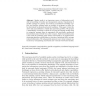Free Online Productivity Tools
i2Speak
i2Symbol
i2OCR
iTex2Img
iWeb2Print
iWeb2Shot
i2Type
iPdf2Split
iPdf2Merge
i2Bopomofo
i2Arabic
i2Style
i2Image
i2PDF
iLatex2Rtf
Sci2ools
110
click to vote
AIMSA
2004
Springer
2004
Springer
Advances in Profile Assisted Voicemail Management
Abstract. Spoken audio is an important source of information available to knowledge extraction and management systems. Organization of spoken messages by priority and content can facilitate knowledge capture and decision making based on profiles of recipients as these can be determined by physical and social conditions. This paper revisits the above task and addresses a related data sparseness problem. We propose a methodology according to which the coverage of language models used to categorize message types is augmented with previously unobserved lexical information derived from other corpora. Such lexical information is the result of combining word classes constructed by an agglomerative clustering algorithm which follows a criterion of minimum loss in average mutual information. We subsequently generate more robust category estimators by interpolating class-based and voicemail word-based models.
AIMSA 2004 | Artificial Intelligence | Data Sparseness Problem | Lexical Information | Such Lexical Information |
| Added | 20 Aug 2010 |
| Updated | 20 Aug 2010 |
| Type | Conference |
| Year | 2004 |
| Where | AIMSA |
| Authors | Konstantinos Koumpis |
Comments (0)

